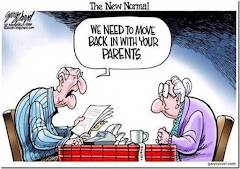Recently I attended a language awards program for the Hempfield School District to watch my granddaughter receive a Spanish award. One of the presenters was head of their English as a Second Language program. I was surprised to hear her report on the number of students from all of the world who come to their school not being able to speak any English. It was amazing to hear how many different countries and languages were involved. I couldn't help but think of the difficult task for both the teachers and the students since English is such a very difficult language to learn.
A few days later somebody sent me a list of tips for learning and teaching English. With apologies to the late Miss Enck and my father who both taught me all that I know about English, I thought the list might be of interest to you.
1. Verbs HAS to agree with their subjects.
2. Prepositions are not words to end sentences with.
3. And don't start a sentence with a conjunction.
4. It is wrong to ever split an infinitive.
5. Avoid cliches like the plague. (They're old hat)
6. Also, always avoid annoying alliteration.
7. Be more or less specific.
8. Parenthetical remarks (however relevant) are (usually)unnecessary.
9. Also too, never, ever use repetitive redundancies.
10. No sentence fragments.
11. Contractions aren't necessary and shouldn't be used.
12. Foreign words and phrases are not apropos.
13. Do not be redundant; do not use more words than necessary; it's highly superfluous.
14. One should NEVER generalize.
15. Comparisons are as bad as cliches.
16. Eschew ampersands & abbreviations, etc.
17. One-word sentences? Eliminate.
18. Analogies in writing are like feathers on a snake.
19. The passive voice is to be ignored.
20. Eliminate commas, that are, not necessary. Parenthetical words however should be enclosed in commas.
21. Never use a big word when a diminutive one would suffice.
22. Use words correctly, irregardless of how others use them.
23. Understatement is always the absolute best way to put forth earth-shaking ideas.
24. Eliminate quotations. As Ralph Waldo Emerson said, "I hate quotations. Tell me what you know."
25. If you've heard it once, you've heard it a thousand times: Resist hyperbole; not one writer in a million can use it correctly.
26. Puns are for children, not groan readers.
27. Go around the barn at high noon to avoid colloquialisms.
28. Even IF a mixed metaphor sings, it should be derailed.
29. Who needs rhetorical questions?
30. Exaggeration is a billion times worse than understatement.
31. Proofread carefully to see if you any words out.










1 comment:
Leave is the word you did not use.
Post a Comment